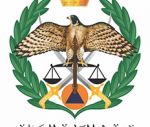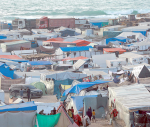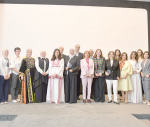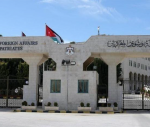You are here
Brotherhood’s ‘military show’ triggers debate on approach to group
By Khetam Malkawi - Aug 15,2014 - Last updated at Aug 15,2014
AMMAN — The government is not likely to take a decision to outlaw the Muslim Brotherhood at the present despite what observers describe as radicalisation of the group by its members.
Some columnists and observers complain that the Islamist group has been taking more radical stands in the wake of the Israeli aggression on Gaza, noting that last week the group organised a “military parade” during a pro-Gaza rally in Amman and that it has been using “harsh language” against the state.
Following that parade, there were calls for banning the group, with some news reports claiming that the government is studying outlawing them as they are not working “under any legal cover”.
For its part, the Islamist group said in a statement that last week’s event was a peaceful expression of a political stand, crying foul that it was blown out of proportion as part of a campaign to demonise the largest opposition group.
The Muslim Brotherhood is not registered under any law in Jordan, and it has been operating under a Cabinet decision that goes back to the 1960s, according to political analyst Samih Maaytah.
Maaytah, a former media minister, said a ban on the group’s activities might not be on the table, but they should be regulated under either the parties or the charities law.
One of the choices, he told The Jordan Times, is to integrate the group and its political arm, the Islamic Action Front Party to unite into a political entity.
The Brotherhood’s recent statements and the “military parade” were also criticised by political analyst Oraib Rentawi, who said organisers delivered the wrong message.
“A military parade was understood as a representation of Izzeddine Al Qassam Brigades [Hamas’ military arm] in Jordan… The war is in Gaza, not in Jordan, and so the military show was not necessary,” Rentawi told The Jordan Times.
However, the columnist warned that banning the Brotherhood will lead to the rise of more radical groups, such as the Jihadi Salafists, which, he said, already exist in Jordan, but will gain more ground.
But according to Maaytah, the recent activities and statements by the group show that they are just as extremist as any radical group.
“With their recent behaviours, they cannot be described as moderate,” Maaytah said.
But both analysts agreed that the war in Gaza and the role of Hamas emboldened the Muslim Brotherhood in Jordan which ever since Egypt’s army removed Islamist president Mohamed Morsi from power was keen to keep a low profile.
Al Ghad columnist Fahed Kheitan offered a diagnosis of the worsening relationship between authorities and the opposition group.
He said the speeches delivered by the Islamic movement during events held in solidarity with Gaza in Jordan have undermined the “truce” with the state, which, in return, embarked on a media campaign to refute Islamists’ accusations.
In a recent column, the writer said these campaigns, like all the previous ones, implied threats to dissolve the Brotherhood organisation.
“Whether in style or content, the country returned to square one: the escalation between the government and Islamists.”
He also agreed with other analysts that the failure of the so-called Arab Spring to bring the desired change has eased the bickering over the internal path of reform, but the tension resurfaced following the Israeli attack on Gaza Strip.
However, this time, the government has taken the initiative in showing its goodwill, according to Kheitan.
This was obvious when Prime Minister Abdullah Ensour said in one of his meetings during the week that any alternative to the Islamic movement will “be no good”.
However, a meeting with chief editors of daily newspapers and columnists on Thursday, Ensour rejected the accusations that underestimated Jordan’s role in stopping the Israeli aggression against Gaza. He was signalling to the Islamic Movement in Jordan.
The entire country, the leadership, the government and the people all stand with Gaza, he said.
“This is not a new stance but Jordan has always been the biggest supporter of Palestinians,” Ensour told the gathering, adding that relief and medical aid to Gaza never stopped during the aggression.
The premier called on the Muslim Brotherhood not to use the war on Gaza to cast doubt on the Jordanian role to end the crisis.
Still government officials decline to comment on the possibility of banning the group, except for Minister of Political and Parliamentary Affairs Khalid Kalaldeh, who previously told The Jordan Times that as long as it abides by the law, the group would not be banned.
Omar Obeidat contributed to this report
Related Articles
The recent arrest of a key Muslim Brotherhood figure has exposed the influence of internal disputes within the largest opposition group, but is not likely to lead to a serious showdown between the Islamists and the government, or a ban on the Brotherhood, sources agreed.
AMMAN — It is in the best interests of the “old” Muslim Brotherhood (MB) group to take part in the next parliamentary elections, pundits hav
AMMAN — As it marks its 70th anniversary, the Muslim Brotherhood in Jordan is facing unprecedented local, regional and organisational challe
















